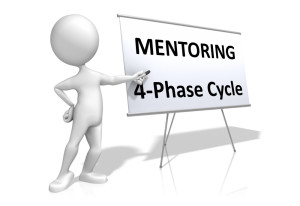Mentoring is a proven way to promote employee growth and development, accelerate learning, fast track leadership, improve retention, elevate morale, strengthen recruitment and promote diversity. Too often, people step into their mentoring roles without sufficient training, relying on their good intention or past experience to carry the day.
Successful relationships require a mentor to be adept at building trusting relationships with mentees, who often may be intimidated working with a more senior leader, or uncomfortable sharing vulnerabilities or challenges. Mentors need to understand the key components of mentoring, including negotiating agreements, creating accountability assurances and how to avoid common pitfalls and that tend to upend mentoring relationships.
Meet Mike, Kim and Jeff. Each of them had good intentions but missed the mark because they weren’t fully prepared for their role.
In the past, Mike had informally mentored a number of junior associates, and enjoyed these relationships. However, this was the first time he had actually participated in a formal mentoring relationship. After four months, his mentee, Aaron, had made little progress. Aaron’s low level goals were getting him nowhere and he frequently cancelled meetings at the last moment. More than once, Mike encouraged Aaron to become a more active participant in his own growth and development, but nothing seemed to shift. Mike was not enjoying this relationship.
Kim had been assigned as Trina’s mentor. Since she and Trina had worked together on projects, Kim thought it would be easy to mentor her. She assumed that they could skip over the relationship-building component and dive right into goal setting. Kim was confused when Trina seemed to be withholding, and profoundly disappointed when, after three months, the relationship completely stalled out.
Jeff held a deep passion for helping young talent in the company come up through the ranks. He took great pride in his role as a mentor and relished the opportunity to share his wisdom and provide sound advice. He always had a list of business books and journal articles to recommend to help mentees acquire leadership skills. Despite his own enthusiasm for mentoring, his mentees never seemed as satisfied or committed. He didn’t understand why.
Mike, Kim and Jeff all had good intentions. They all wanted to help their mentees grow and develop. Like most mentors, they assumed their past experiences with informal mentoring would be sufficient. As it turned out, they could have each benefited from mentoring training.
With training, Mike would have discovered why Aaron was lacking enthusiasm and energy for achieving his goals. He would have learned how to set expectations up front that put the mentee in the driver’s seat. He would have learned strategies to help his mentee set robust and SMART goals that facilitate growth and development.
Even though Kim knew Trina in a work setting, a successful mentoring relationship requires trust and safety. Mentoring training would have helped Kim understand the importance of taking the time to set the stage for the work ahead. She would not have made the assumption that Trina felt safe enough to be open and honest with a senior colleague. Kim would have learned which questions to ask to get to know Trina in a different way. She would probably have been surprised to learn that she had skipped over the most important phase of the mentoring cycle, preparing the relationship.
 Jeff was driving his mentoring relationships instead of creating a partnership with his mentees. While his mentees might have appreciated the many resources he shared with them, mentoring isn’t about reading books and journals. Mentoring isn’t about listening to the wisdom of the mentor and hearing about their experiences. In this kind of relationship, the mentee never fully engages. Had Jeff had some training under his belt, he would have discovered that open two-way conversation was an essential part of mentoring right from the get-go. He would have learned that the only way for mentees to achieve good results is to feel a sense of ownership in the relationship. Knowing more about the different learning styles of his mentees would have helped him better support them in their learning.
Jeff was driving his mentoring relationships instead of creating a partnership with his mentees. While his mentees might have appreciated the many resources he shared with them, mentoring isn’t about reading books and journals. Mentoring isn’t about listening to the wisdom of the mentor and hearing about their experiences. In this kind of relationship, the mentee never fully engages. Had Jeff had some training under his belt, he would have discovered that open two-way conversation was an essential part of mentoring right from the get-go. He would have learned that the only way for mentees to achieve good results is to feel a sense of ownership in the relationship. Knowing more about the different learning styles of his mentees would have helped him better support them in their learning.
Learning Point: Being an effective mentor requires more than just good intention. It also requires knowledge, competency and skill to be successful. Mentoring training plays a key role in the development all three of these important keys to success. It also impacts the quality of mentoring relationships. Mentors who are well-prepared do indeed report more fulfilling and mutually satisfying mentoring relationships.



